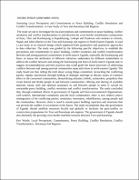| dc.description.abstract | OSODO PHILIP (2008-M083-10019)
Assessing Local Perceptions and Commitments to Peace Building, Conflict Resolution and Conflict Transformation: A Case Study of Teso and Karamoja Sub Regions.
The study set out to investigate the local perceptions and commitments to peace building, conflict resolution and conflict transformation in and between the cross-border resettlement communities of Iteso, Thur and Karimojong at Kapelebyong, Lokopo and Nyakwae sub-counties in Amuria, Napak and Abim districts in the Teso and Karamoja sub regions in North Eastern Uganda. It used a case study as its research design which employed both quantitative and qualitative approaches to data collection. The study was guided by the following specific objectives; to establish the perceptions and commitments to peace building, conflict resolution and conflict transformation between and among pastoral communities in north eastern Uganda, especially the Karimojong and Iteso; to assess the attribution of different initiatives undertaken by different stakeholders to address the conflict between and among the Karimojong and Iteso of north eastern Uganda and; to suggest recommendations and best practices that could guide the future processes of addressing conflicts between and among pastoral communities especially those in north-eastern Uganda. The study found out that, telling the truth about wrong things committed, reconciling the conflicting parties, regular interactions through holding of dialogue meetings to discuss issues of common effect to the concerned communities, demystifying attitudes, beliefs, animosities, prejudices that create hatred and divide people in and between communities, offering and sharing of available material, moral, skill and spiritual assistance to and between people in need is crucial for sustainable peace building, conflict resolution and conflict transformation. The study concluded that, through combined efforts of government of Uganda and Non-Governmental Organisations, well-wishers, international community and the local communities, there is now relative peace; reintegration of the conflicting parties, restitution, restoration, rehabilitation, among people and the communities. However, there is need to sustain peace building capacities and structures that can prevent the conflict re-occurrences in the future. The study recommends that, the government of Uganda should mobilise resources locally and globally to facilitate the post-conflict re-construction programmes for Teso and Karamoja sub-regions. The government of Uganda should also demystify the growing cross-border land/line tensions between Teso and Karamoja.
Key Words: Local Perceptions, Commitments, Peace Building, Conflict Resolution, Conflict Transformation, Karamoja Sub Regions. | en_US |


